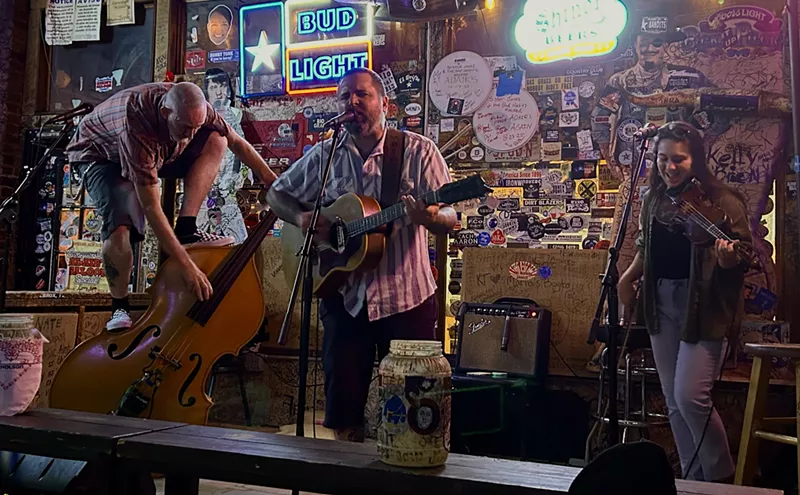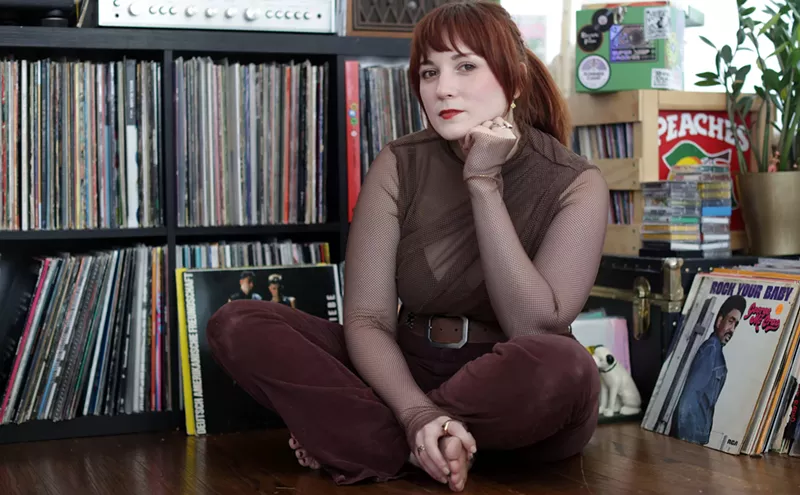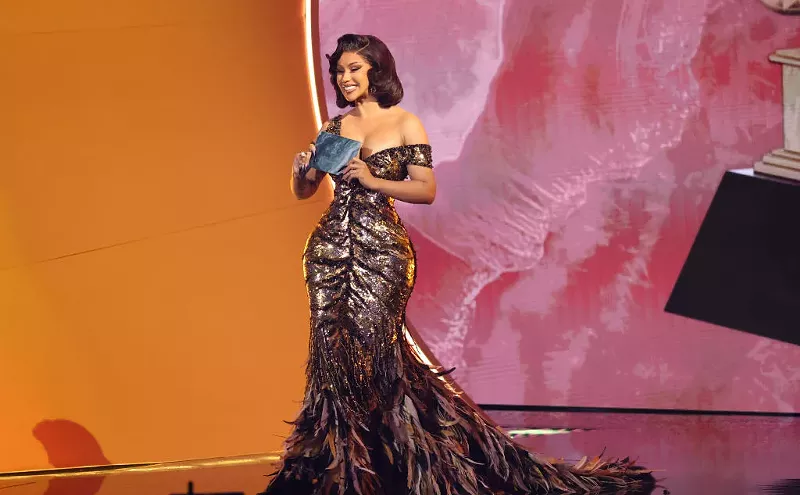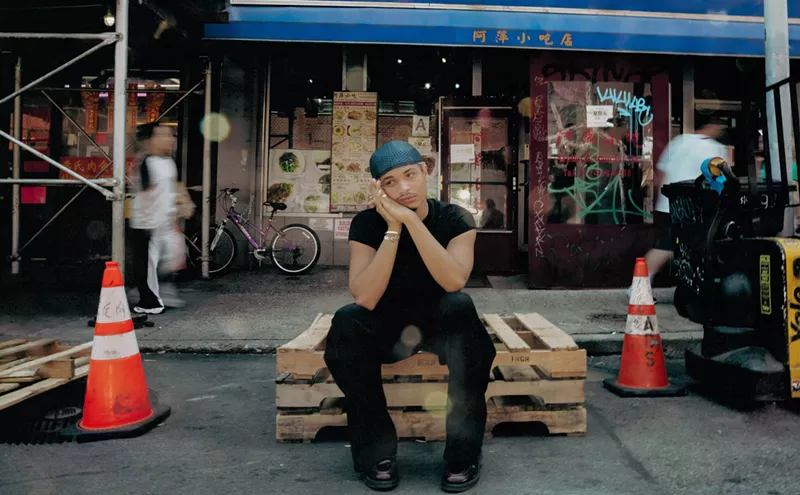This is rock and roll at the end of the century. Suddenly, the finish line looks a whole lot like the starting point.
Kevin Russell and Jimmy Smith, co-singers and songwriters in the Gourds, didn't plan it this way, didn't intend to play traditional music with museum instruments. They're rockers from way back, young men who once played in a Dallas band Russell would later insist took its cues from Elvis Costello, Graham Parker, and the Replacements. A decade ago, he and Smith never dreamed of playing with a fiddle-banjo-dobro-accordion player who, at 29, is only now being introduced to the Beatles. For God's sake, where do you even find a guy like that?
"I don't ever wanna rock again," Russell insists from his home in Austin. "It's too loud. I can't handle that volume. I can't sit and listen to those kinds of bands anymore. If some guy's pissed off about something, I don't wanna hear about it. I'm not interested. I love this Gourds thing. Hell, one day I'd like to play with even less--no drums or bass, just me and two or three people, a real stripped-down thing. That's more of where I'm headed. I'm gettin' old--I'm 31." He doesn't laugh when he says this. He ain't joking.
Maybe that's because when you listen to the Gourds' four albums--1996's Dem's Good Beeble, 1997's Stadium Blitzer, last year's gogitchyershinebox EP, and the just-released Ghosts of Hallelujah--he doesn't sound at all like a young man. Levon Helm is more like it, back when the Arkansas traveler was hitting those sweet-spot high notes with four Canadian journeymen behind him. Russell's got a voice that belongs behind glass--it belongs to the ages, all twang and glory.
It's Jimmy Smith who still sounds like the rock star, Nebraska-era Bruce Springsteen doing Eddie Vedder impressions on Hoot Night. Nothing pretty about his voice; it's all power and command, volts and watts. You can almost see the spotlight on him when you listen to the Gourds' records. Together, Russell and Smith are like yesterday and tomorrow--John Doe duking it out with Exene Cervenka, Gram Parsons tangling with Emmylou Harris, and on and on. Their voices fit together like muscle and skin.
Especially when heard on Ghosts of Hallelujah, the finest of all the Gourds' albums, because it's the first to capture what this band sounds like on stage. It's a hurricane instead of a breeze, no overdubs and everything written in stone after only two or three takes. If its predecessors were like sloppy Saturday-night drunks cleaned up for Sunday-morning church, the new disc is reckless and all the better for it. It's not afraid to get loud ("Ladies Choice"), not afraid to play low and slow ("Pair of Goats"), not afraid to let it rip and pay for the consequences later on. The whole thing sounds as though it were recorded on a front porch in about a week.
And this time around, the Gourds count among their ranks the likes of drummer Keith Langford (stolen away from the Damnations TX just after the band finished recording its major-label debut, Half Mad Moon) and multi-instrumentalist Max Johnston, the secret weapon behind Uncle Tupelo's 1993 farewell Anodyne and Wilco's 1995 debut A.M. Man for man, including multi-instrumentalist Claude Bernard, there's probably not a better band in Texas right now.
As good as the Gourds' earlier recordings are--especially the EP, with its live tracks and novel-but-not-novelty takes on David Bowie's "Ziggy Stardust" and Snoop Doggy Dogg's "Gin & Juice"--Ghosts of Hallelujah far exceeds them all. It's archaic and immediate at once, rollicking and plaintive and somewhere in between, as indescribable and familiar as damp air on a summer morning. Imagine The Band recorded 30 years after the fact, or Anodyne by boys who never had to try to sound authentic. It's country music, if your idea of country means a large land mass with lots of options in between stops on the map. It's traditional if your definition of the word means every single thing that came before yesterday.
After two records spent proving a band need not plug in to rock the house, the Gourds have finally managed the impossible: Ghosts of Hallelujah puts the listener smack in the middle of one of their concerts, among the swirling hippie chicks and Shiner Bock boys who hoot and holler their way through the originals and brilliant covers, among then "Gin & Juice" recast as an Appalachian breakdown. Sure, there's nothing funnier than listening to Russell sang-and-twang about the "bitches in the living room gettin' it on" and his "pocketful of rubbers." But once the smile subsides, there's the actual song to deal with--a gangsta anthem transformed into a folkways gem. This time around, there's "Gangsta Lean," the funkiest thing The Band never recorded.
"You know, I never listened to The Band when we started the Gourds," says Russell, who has heard comparisons to The Band more often than he's heard his own name during the past four years. "I had heard the hits, but I never bought a Band record. But when people started saying it, I went and bought The Band, which is a great record, and so I tried to write a few songs on purpose that sounded like The Band, like 'Money Honey' [on Dem's Good Beeble] and 'Gangsta Lean.' I tried to even use the voice. It's fun to do. It's like playin' like you're someone else you're not--it's role-playing. It's a real playful thing. It's almost a joke at first."
It seems like forever since Russell, Smith, and Rob Bernard (Claude's brother) were playing in a rock-and-roll band. But it was only eight years ago that the boys packed up the van and left Dallas for Austin. They skipped town because their band, the Picket Line Coyotes, seemed to draw smaller crowds with each downtown gig. There were just too many white funk bands to contend with, too many Denton boys with horny-horns filling the bills.
The Coyotes never felt as though Dallas cared much for what they had to offer--two-track, breakneck rock and roll filtered through Russell's round Southern-boy twang. One day, perhaps, the world will stumble upon those old Coyote tapes (there were three, each a precious commodity now) and realize that right here--in a city where so many clubs sit on a street called Commerce--a band made the very same brand of muddy-roots rock that would make two boys from Belleville, Illinois, very famous in a cult sort of way. Until that happens, know this: The Coyotes were doing Uncle Tupelo long before Jay Farrar and Jeff Tweedy started hating each other.
The Coyotes also left town because they never found in Dallas what Russell and Bernard had left behind in their old hometown of Shreveport, Louisiana--that "pseudo-intellectual community," as Russell puts it, of artists (musicians, painters, writers) bound together by the common cause of creating, sharing, and exploring for the sheer what-the-hell of it. Used to be you could go downtown on a Thursday night and find Russell on a stage at Dave's Art Pawn Shop or a stool at The Art Bar, where he would be reading some caustic, hysterical prose from his journal. But too often, when he looked out into the crowd, he saw the same faces--old friends who had moved to Dallas from Louisiana. Enough was enough.
So Russell, Bernard, and Smith--who joined the Coyotes in 1989--stowed their instruments and left for Austin, where they had stumbled across like-minded musicians, among them the Wannabes and ex-Reiver John Croslin. If nothing else, Russell says now, he and his bandmates figured it would be "more fun" to live in a place where newcomers lovingly speak of the vibe and atmosphere as though Austin were still a small town instead of a burgeoning concrete sprawl.
Only when they moved south, Russell says, "Austin didn't want to have anything to do with the Picket Line Coyotes." The band broke up in 1992.
After the bust-up, Smith moved to Nacogdoches and started writing his own songs, a task that had been primarily Russell's in the Coyotes. Russell played around Austin for a little bit with Ron Byrd, an old buddy from Shreveport; he'd also show up at the now-defunct Chicago House and keep reading from his notebook. He thought he was through being in bands.
But around then, Russell was becoming enamored of a group featuring two other ex-Dallas boys, Mark Rubin and Danny Barnes, who had marked time in Killbilly and were playing under the name the Bad Livers--and only beginning to prove it was possible to turn Iggy Pop into Bill Monroe. Russell would hear the Bad Livers every week at an Austin bar, the Saxon Pub, where the Livers played for free after Monday Night Football.
Rubin recalls now that no one ever paid attention, which made it the "coolest gig you could ever have, since we could play anything." It was there that Rubin (on tuba, accordion, and stand-up bass), Barnes (on banjo), and Ralph White (fiddle) found their sound somewhere behind the cases of Shiner. As often happens in Austin, a scene sprang up around the Livers' residency. In time, Butthole Surfer Gibby Haynes would show up and sing with them. The whole thing served as an inspiration for a young Russell, who didn't know what the hell he was going to do next.
"I never wanted to play that much traditional music, but seeing what they were doing solidified what I wanted to do after the Coyotes," Russell says. "I knew I could never be like Danny Barnes--he's from another planet--but I knew I could use any instrument I wanted and play whatever song I wanted. Hearing them do an Iggy Pop song was when I thought, 'That's cool.' You can play acoustic instruments and play punk rock and do it tastefully--not loud, not adolescent."
Rubin's voice rises in delight when he hears about Russell's appreciative nod. The two men have become friends, part of that clique Russell, and Rubin, for that matter, so desperately wanted in Dallas but never found. Only last week, Rubin sold Russell a 1918 mandolin, and the Bad Liver speaks optimistically of one day recording with Russell, just the two of them, armed to the teeth with decades-old instruments like folk-music militia men.
"That's an example of a guy getting it," Rubin says of Russell. "Our whole purpose was to show you could play acoustic music and be inventive and even subversive and not suck. You didn't have to have a shtick. You could concentrate on having a good time and not beat people over the head with it."
A few years after those Saxon Pub gigs, the Bad Livers would have the Gourds open for them on a regular basis. But Rubin would eventually cut the band loose, complaining that their use of a drummer was too loud and annoying. That, Rubin says, "and they got way too damned good, and it's never a good idea to have an opening act that could possibly kick your ass."
Around 1993, Russell went to Laurel's Ranch in Comfort, Texas, and began recording some of his own solo material. Around that time, Smith had returned to Austin and began playing with Claude Bernard, Rob's brother. (Rob would eventually resurface in the Damnations, best described as the Gourds with ovaries and an X fixation.) It only made sense to consolidate efforts, and the foursome formed The Grackles--which fell apart around the same time Russell and Smith began having trouble getting along with Byrd, who was eventually pink-slipped. Byrd ended up with Prescott Curlywolf, which signed to Mercury Records. The Gourds came into being once drummer Claude Llewellin stepped in, around 1994.
"I was thinking I shouldn't play with Jimmy, that I should move on and let him do his thing and do my thing," Russell says. "But I can't imagine playing without him now. I am sure I could do it, but I wouldn't want to, because he's the best bass player since [The Band's] Rick Danko. At least that's what Doug Sahm says."
Russell talks about how the Gourds were originally a sort of reaction against the Picket Line Coyotes. Maybe it wasn't a conscious decision to play soft, to abandon rock, but somewhere in the back of his mind, he had grown cold to the idea of once more strapping on an electric guitar and having to jump up and down like a monkey. Besides, he had always written songs on the acoustic guitar; it was the instrument his father played. And if nothing else, playing acoustic meant having to shlep around fewer amps.
"I listened to a lot of singer-songwriter stuff from the '70s--James Taylor and Jim Croce," he says. "I always had that drippy sentimental leaning. Country was bad in the late '70s and early '80s, and as a kid, I couldn't dig it. It was years later before I realized how cool it was. But playing electric made more sense. It's easier to play electric live. And when you're in a band with Rob [Bernard], you're gonna be in a loud fucking band. I'm amazed at how restrained he is in the Damnations. I'm like, 'Why the fuck couldn't you do it back then?'" No matter: Rob Bernard has appeared on both Stadium Blitzer and Ghosts of Hallelujah.
But it's the addition of Johnston that's perhaps the most notable thing about the new record. It's his fiddle-playing, his mandolin, his dobro and banjo that define Ghosts. His presence roots the disc in tradition, if only for the fact that until he joined Jeff Tweedy and Jay Farrar in Uncle Tupelo in 1993, Max Johnston claims he'd never even heard rock and roll.
That's part of the reason Johnston and Wilco parted ways after the recording of Wilco's second record, Being There, in 1996. Johnston and Tweedy were going in separate directions: Tweedy wanted to become Lennon and McCartney, and Johnston had no idea what the hell Tweedy was talking about. While Johnston was sitting in the corner of the studio trying to figure out how to force a banjo into a psychedelic pop song, the rest of the band was waiting for him to play catch-up. In the end, everybody was miserable. When Johnston was fired, he couldn't decide whether he was furious or relieved.
Johnston would eventually move to Kentucky and play with Freakwater, but he wanted to come back to Dallas to be near his father, "Dollar" Bill Johnston, a folk-music hero. An old roommate of his gave Max a tape of some Gourds music and told him he should give Russell a call. He played his first gig with the Gourds during last year's South by Southwest conference in Austin: Johnston just showed up at the Hole in the Wall and let loose. You'd never have known he and the band had never even met before then--it was a sloppy and spectacular show, more gin than juice.
"When I was in Wilco, [a friend] played me the tape, and I was like, 'What am I doing in a rock band?'" Johnston says. "I heard Kevin's voice, I heard Jimmy's quirky songs, I heard a loose feel, which is kinda the way I play--kinda ragged. It sounded fun. They looked like they're having fun up there, and they're all such really good people. They're a dream to hang around with. And that first show, I had the time of my life. I know I probably messed a lot of stuff up, but it felt good. That was the beauty--I sat there, and we just played. I was rough, they were rough, and we all picked each other up." Johnston does say being in the Gourds is a lot like being in Uncle Tupelo--except the two singers get along.
Every now and then, Russell will run in to someone who owns a copy of the Picket Line Coyotes' Fashion Dogs, released in 1987, or 1990's We Shall Annex the Sudetenland. They might shout out a request for "Benevolent Dictator" or "Pills." And Russell's response is usually the same: "Get the hell outta here." He has long since moved beyond a band whose legacy consists of three cassettes. Russell will acknowledge that Ghosts of Hallelujah hints that he and Smith are inching ever closer to what they sounded like way back when. But it's just a function of having played live all these years, having to compete with barroom chitchat.
Russell would rather look ahead, though perhaps not too far. The new record was to be the last for the band's tiny label, Munich Records (based out of the Netherlands...and Austin), but they've decided to stick with it for one more album. Meanwhile, their friends keep getting deals with majors, though Russell insists he doesn't want to be in the Damnations' position. Not for anything.
"I know now this is the best way to do it," he says. "You just take your time and build your grassroots following around the U.S. and Europe. You don't make a lot of money, but you make a living, and over time you build this into something you make a lot of money at." Here, he laughs. "I don't like their music, but Phish has been very smart about it. That's the model we use--try to be as accessible to the fans as you can and just do it, and take as many years as you need. We're not messing around with a major label. You're screwed either way. If you don't sell, you're dropped, and you may lose your masters. And if you do sell, you're famous and you gotta make videos and be a pop star, and none of us want to do that. That would be a complete distraction. This is our lives we're talking about--our family, our homes, our music. We're trying to figure out how to make money and have a good life."
The Gourds perform March 6 at the Gypsy Tea Room. The Baptist Generals open.












